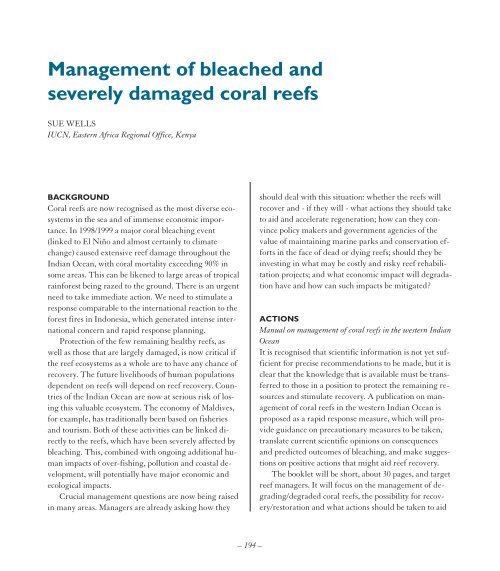You also want an ePaper? Increase the reach of your titles
YUMPU automatically turns print PDFs into web optimized ePapers that Google loves.
Management of bleached and<br />
severely damaged coral reefs<br />
SUE WELLS<br />
IUCN, Eastern Africa Regional Office, Kenya<br />
BACKGROUND<br />
Coral reefs are now recognised as the most diverse ecosystems<br />
in the sea and of immense economic importance.<br />
In 1998/1999 a major coral bleaching event<br />
(linked to El Niño and almost certainly to climate<br />
change) caused extensive reef damage throughout the<br />
Indian Ocean, with coral mortality exceeding 90% in<br />
some areas. This can be likened to large areas of tropical<br />
rainforest being razed to the ground. There is an urgent<br />
need to take immediate action. We need to stimulate a<br />
response comparable to the international reaction to the<br />
forest fires in Indonesia, which generated intense international<br />
concern and rapid response planning.<br />
Protection of the few remaining healthy reefs, as<br />
well as those that are largely damaged, is now critical if<br />
the reef ecosystems as a whole are to have any chance of<br />
recovery. The future livelihoods of human populations<br />
dependent on reefs will depend on reef recovery. Countries<br />
of the Indian Ocean are now at serious risk of losing<br />
this valuable ecosystem. The economy of Maldives,<br />
for example, has traditionally been based on fisheries<br />
and tourism. Both of these activities can be linked directly<br />
to the reefs, which have been severely affected by<br />
bleaching. This, combined with ongoing additional human<br />
impacts of over-fishing, pollution and coastal development,<br />
will potentially have major economic and<br />
ecological impacts.<br />
Crucial management questions are now being raised<br />
in many areas. Managers are already asking how they<br />
should deal with this situation: whether the reefs will<br />
recover and - if they will - what actions they should take<br />
to aid and accelerate regeneration; how can they convince<br />
policy makers and government agencies of the<br />
value of maintaining marine parks and conservation efforts<br />
in the face of dead or dying reefs; should they be<br />
investing in what may be costly and risky reef rehabilitation<br />
projects; and what economic impact will degradation<br />
have and how can such impacts be mitigated?<br />
ACTIONS<br />
Manual on management of coral reefs in the western Indian<br />
Ocean<br />
It is recognised that scientific information is not yet sufficient<br />
for precise recommendations to be made, but it is<br />
clear that the knowledge that is available must be transferred<br />
to those in a position to protect the remaining resources<br />
and stimulate recovery. A publication on management<br />
of coral reefs in the western Indian Ocean is<br />
proposed as a rapid response measure, which will provide<br />
guidance on precautionary measures to be taken,<br />
translate current scientific opinions on consequences<br />
and predicted outcomes of bleaching, and make suggestions<br />
on positive actions that might aid reef recovery.<br />
The booklet will be short, about 30 pages, and target<br />
reef managers. It will focus on the management of degrading/degraded<br />
coral reefs, the possibility for recovery/restoration<br />
and what actions should be taken to aid<br />
– 194 –


















